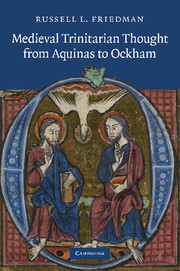Book contents
- Frontmatter
- Contents
- Acknowledgments
- List of symbols, abbreviations, and conventions
- Introduction
- 1 The Trinity and the Aristotelian categories: different ways of explaining identity and distinction
- 2 The Trinity and human psychology: “In the beginning was the Word”
- 3 The Trinity and metaphysics: the formal distinction, divine simplicity, and the psychological model
- 4 The Trinity, divine simplicity, and fideism – or: was Gilson right about the fourteenth century after all?
- Appendix: Major elements in Franciscan and Dominican trinitarian theologies
- Bibliography of primary sources
- Annotated bibliography of selected secondary literature
- Index
3 - The Trinity and metaphysics: the formal distinction, divine simplicity, and the psychological model
Published online by Cambridge University Press: 26 February 2010
- Frontmatter
- Contents
- Acknowledgments
- List of symbols, abbreviations, and conventions
- Introduction
- 1 The Trinity and the Aristotelian categories: different ways of explaining identity and distinction
- 2 The Trinity and human psychology: “In the beginning was the Word”
- 3 The Trinity and metaphysics: the formal distinction, divine simplicity, and the psychological model
- 4 The Trinity, divine simplicity, and fideism – or: was Gilson right about the fourteenth century after all?
- Appendix: Major elements in Franciscan and Dominican trinitarian theologies
- Bibliography of primary sources
- Annotated bibliography of selected secondary literature
- Index
Summary
THE DIVINE ATTRIBUTES, THE SEARCH FOR SIMPLICITY, AND THE POSSIBILITY OF TRINITARIAN EXPLANATION
I want to begin this chapter by taking stock of where we are in our story. In Chapter 1, I sketched out two different ways in which later-medieval theologians tried to explain how the Father, the Son, and the Holy Spirit are personally distinct but essentially identical. Specifically, Dominican theologians, following Thomas Aquinas, turned to the very relations between the persons to explain how they were distinct, utilizing what I called the “relation account of personal distinction.” Franciscan theologians, on the other hand, following a tendency in Bonaventure's thought, appealed to the different ways that the divine persons emanate, or receive being, to explain how they are distinct from one another. In Chapter 2, I showed how yet another major element in later-medieval trinitarian thought was brought into play: the psychological model of the Trinity. This model, descending from Augustine of Hippo, claims that human psychology – particularly the activities and architecture of the human mind – in some way reflects the Trinity, and hence can be used to illuminate or maybe even to explain the identity and distinction of the divine persons. In particular, the Son is a mental Word or Concept, and Augustine described in some detail how the formation of a concept in our minds resembles the way that the Father and the Son are completely identical except for one minimal distinction.
- Type
- Chapter
- Information
- Medieval Trinitarian Thought from Aquinas to Ockham , pp. 94 - 132Publisher: Cambridge University PressPrint publication year: 2010



